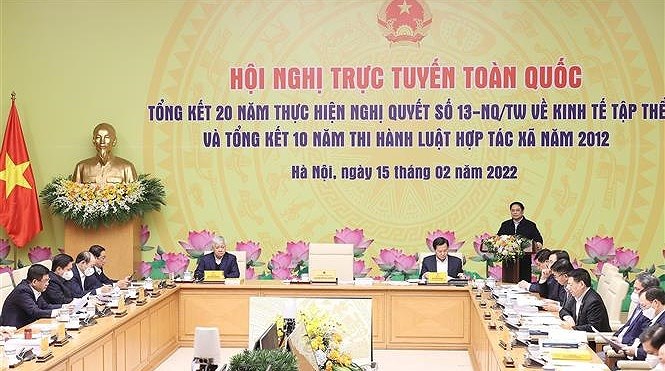 Prime Minister Pham Minh Chinh speaks at the ational teleconference on February 15 (Photo: VNA)
Prime Minister Pham Minh Chinh speaks at the ational teleconference on February 15 (Photo: VNA)– A
national teleconference was held on February 15 to review the 20-year
implementation of the Party Central Committee’s resolution on the collective
economy and the 10-year enforcement of the Law on Cooperatives.
According to a report delivered
at the event, the collective economy and cooperatives have recorded new strides
in quality and quantity development, managed to address lingering weaknesses,
and increasingly affirmed their development potential and prospects.
However, there remain many
problems in the collective economy, which has yet to fully optimise its
potential, the report noted.
There were 27,445
cooperatives and cooperative alliances nationwide in 2021, up 41 percent from
2013, employing about 1.1 - 1.2 million workers per year. In 2020, each
cooperative earned about 4.3 billion VND (188,900 USD at the current exchange
rate) in income and 314 million VND in profit on average, up 61 percent and 88
percent from 2013, respectively.
Over the past years, per
capita income of cooperatives’ workers has been on the rise, from 44.6 million
VND in 2017 to 52.8 million VND in 2019, narrowing the gap with the income of
enterprises’ workers.
Addressing the event, Prime
Minister Pham Minh Chinh affirmed that the collective economy, with
cooperatives being the core, is an important economic element always
facilitated by the Party and State and gradually getting established in the
national economy.
He highlighted some key targets,
orientations, and measures for promoting the collective economy in the time
ahead, noting that it is necessary to enhance Party cadres and members, and people’s
awareness of the collective economy, mobilise more resources for and remove
obstacles to its development, fine-tune related legal regulations and policies, and improve the collective economy’s capacity and operational efficiency.
The Government leader also
suggested some directions for amending the law so as to create a
favourable institutional environment for the collective economy to live up to
its role in the formation of a socialist-oriented market economy./.